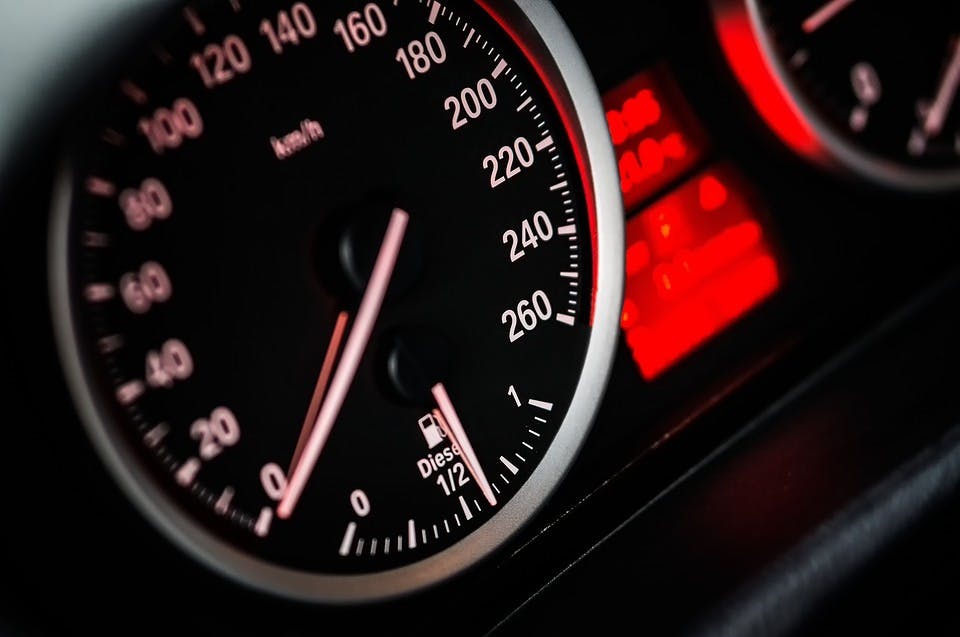
When it comes to driving, even the most experienced drivers can end up making a small mistake on the road. All it takes is one moment of inattentiveness and you could get snapped by a speed camera going well over the limit.
Now, in some cases, this could mean you end up with points on your licence and a hefty fine. In other cases, you might be asked to attend one of the invite-only speed awareness courses.
In this guide, we're going to look at what speed awareness courses are, who is eligible to take one, how it might affect your car insurance and much more!
What are speed awareness courses?
Motorists who've been caught speeding are sometimes given the option to attend a speed awareness course. It's offered by regional police as an alternative to receiving points on a licence and a fine.
As we'll discuss in more detail, these courses are educational workshops that are designed to re-educate speeding offenders—helping them relearn parts of the Highway Code and really understand the consequences of irresponsible driving. The number of motorists opting to take speed awareness courses has increased quite a lot over the past few years. In fact, according to the TTC Group, in 2018, 1.9 million drivers opted to take a course instead of 3 points on their licence and a fine.
While the cost of the course might end up being equivalent to the fine, it still means you avoid racking up penalty points. Remember, if you receive 12 or more within 3 years—or 6 within the first 2 years of driving—you could get disqualified.
Before you start ignoring speed limits entirely, you should know that these courses are only offered to individuals who meet the criteria.
Who is eligible for a speed awareness course?

If you've been caught speeding by a speed camera, or you've been stopped by the police, you'll be sent a Notice of Intended Prosecution and a Section 172 Notice within 14 days. You have to return the Section 172 Notice within 28 days to inform the police of who was driving the car. If you're eligible, you'll be sent the offer of a speed awareness course. If not, your other options are a Fixed Penalty Notice or a court hearing to appeal your offence. Now, these courses are like an exclusive club—you can't ask for an invite, you have to wait for one. For starters, you'll only get the chance to attend one if you've admitted to being the driver of the vehicle at the time of the speeding offence and if you haven't already attended one within the 3 years prior to your current speeding offence.
Additionally, your speed has to have been within certain limits and you can't have committed any further offences at the time of the speeding offence.
If you are eligible to take a speed awareness course, you'll be contacted by the police through a letter. You'll then need to either accept the offer, or decline and take the fine and points on your licence. You can book a course online—the letter will tell you which providers are available in your area. It's not advisable to put it off too long, as you'll have to take it no more than 12 weeks after the date of your speeding offence.
What if I appeal?
Thinking about trying your chances with an appeal? Whilst you are free to do so, you should know that as soon as you make an appeal, the offer of the course will be withdrawn. If you plead not guilty, you'll end up having to go to court. And if they find that you are indeed guilty of speeding, then you could end up with an even bigger fine and more penalty points. The amount you'll be fined will depend entirely on what the speed limit was and how much you were over it.
According to GOV.UK, “it's usually a percentage of your weekly income, up to a maximum of £1,000 (£2,500 if you were driving on a motorway)”. Add that to the fact that you could also be disqualified from driving, and it's a pretty risky move!
How much do they cost and who provides them?
Whilst the cost of a speed awareness course will vary depending on where you live, you're looking at having to pay between £80 to £100. The cost of the course is essentially equivalent (give or take) to the fine you would have to pay otherwise. The main difference, of course, is that opting for a course means you won't have 3 points added to your driving licence.
Speed awareness courses are run by independent companies that are regulated by the National Driver Offender Retraining Scheme (NDORS), working in conjunction with the local police. You can find a list of course locations here, but you won't be able to actually book a course unless you've received an offer from the police.
You can choose to take a course at any location—you aren't restricted to taking it in the area where you committed the speeding offence.
Once you've accepted the police's offer of a course, you'll need to book in online. In order to do so, you'll need your driving licence number and your bank card to pay for the course. Part of this cost will go towards the police force located in the area you committed the offence in. This will cover the cost of processing the offence and the course offer.
What can I expect on the day?

The course will last around 4 to 5 hours, depending on the provider. You won't be the only driver in attendance—you'll be taking the course with up to 25 other people. The course will be structured like a workshop. It's classroom based, though some providers may include in-car practical training. Whilst you won't have to take any official tests, you will have to actively participate in discussions. The entire point of the course is to minimise your chances of speeding in the future and open your eyes to the dangers of speeding.
The workshop will:
- Explore why you were speeding
- Teach you the consequences of your actions
- Update your knowledge of the Highway Code and stopping distances
- Help you understand different speed limits and where they would apply
- Show you how to identify and avoid hazards
- Walk you through potential defensive driving measures
As long as you complete the course to the satisfaction of the provider—staying for the duration of the workshop and participating in discussions—you'll be able to go on your merry way at the end. The provider will get in touch with the police afterwards to let them know you've completed the course.
Bear in mind that your details will be kept in the NDORS database, and if you are caught speeding again within 3 years of taking the course, you'll end up receiving a fine and 3 points on your licence.
You'll need to bring your driving licence with you, or two alternate forms of ID, otherwise you won't be allowed to take the course. You should also aim to get there 15 minutes early.
Why should I take a speed awareness course?
While a speed awareness course will come out at near enough the same price as the fixed penalty for your speeding offence, it's still a better option to take. It means that you avoid receiving 3 points on your driving licence and a speeding conviction on your driving record—factors that would undoubtedly increase your insurance premiums. It's important that you try to limit the number of points you get on your licence.
Why? If you get 12 or more points within a 3 year period, you'll be disqualified from driving. If you're a new driver, the rules are even stricter! Your licence will be revoked if you receive 6 or more points within 2 years of passing your test. Points on your licence also increase your insurance premiums.
Let's face it, no-one wants to spend 4 to 5 hours in a classroom but it's a price worth paying in order to avoid the possibility of getting disqualified from driving. Plus, you'll actually learn some vital information and skills to help you become a safer driver.
Remember, the longer you go without an accident, the better your car insurance options will be.
Will taking the course affect my insurance?

If you end up with a speeding conviction on your record, you will definitely see an increase in your insurance premiums. By taking a speed awareness course, you can avoid the conviction and, potentially, keep your premiums at the same level. This all depends entirely on your insurance provider, however.
In most cases, insurers will only want to know if you have any points on your licence for a motoring conviction or Fixed Penalty Notice. That being said, there are some insurers who will ask if you've ever completed one of these courses. If they do ask, it's likely that filling out 'yes' will result in your premiums rising.
While taking a course will help you become a safer driver, it still tells the insurer you might be prone to ignoring speed limits. To an insurer, this makes you a bit of a risk to insure. Of course, if they don't ask you about them, it can't be used as a factor for determining your premiums. Though you might be tempted to not disclose this information to your insurer if they ask, please be aware that you're legally obligated to tell them.
If your insurer finds out that you've intentionally lied on your insurance forms, they could increase your premiums or invalidate your insurance entirely.
FAQs
1. What if I'm late or can't make it to my appointment?
It's up to you to arrive on time. Heavy traffic is always a possibility, so you need to plan ahead. If you do end up being late, you won't be allowed to join the class. If you're ill, then you should let the provider know as soon as possible. You'll find a contact number on the letter you were sent. You'll need to provide a doctor's note to prove this. The police will then review your case and decide whether or not to offer you another chance to take a course.
2. Do I have to pay for a speed awareness course?
Yep! The cost will vary depending on the course provider and the region you live in. On average, however, you'll have to pay between £80 to £100. You will need to pay for the course online as soon as you book it.
3. How often can you take a speed awareness course?
Once you've attended a course, you won't be allowed to go to another one for 3 years. If you end up with another speeding offence, then you'll have to pay the fine and take the points. Your details will remain on a database if you've taken a course. As such, there's no way to get around it.
4. Can I appeal my offence and take a course if I don't win?
Nope. You're allowed to appeal against your speeding offence, but if you do, the offer to take a course will be rescinded. You also run the risk of receiving a bigger fine and more points if you lose the appeal.
5. Do I need to tell my insurer if I take a speed awareness course?
This will depend entirely on your insurer. You will have to get in touch with your current provider to see if this is something you're legally required to disclose. If you're asked to provide this information when starting with a new insurer, make sure you do.
6. Why haven't I been offered a speed awareness course?
It's entirely up to the discretion of your local police on whether or not to offer you a one of these courses. If you've already taken one within the last 3 years, or you were well above the speed limits stipulated by the police, you won't be offered one.
7. Could I end up failing a speed awareness course?
The only real way you could fail a course is if you go out of your way to do so. In other words, if you don't stay for the duration of the course or if you actively go out of your way not to participate. If you do end up failing, you'll have to take the fine and penalty points. You also won't receive a refund.
8. How many people will be taking the course?
It will vary depending on the provider and how over-subscribed they are at any given time. You're looking at an average of around 15 to 25 attendees.
9. How do I go about booking a course?
After you've received a letter from the police, you'll need to return the form to let them know that you accept the course offer. You need to do this within the time limit in the letter. You can find your local course provider and additional information in the letter.
10. When will I be expected to take this course?
Taking into consideration the fact that many drivers are in full-time work and are unable to take any time off, providers usually offer courses on weekdays and weekends—including evenings.
Subscribe for driving advice, offers & more
We'd love to let you know about our courses, news and offers via email. You may unsubscribe at any time.
Star Genie Limited trading as PassMeFast. Company number 10093359
Copyright © 2024 owned by Star Genie Limited
PassMeFast, Blue Tower, MediaCityUK, Salford, M50 2ST

